Instruments used in anesthesiology
Following is a list of instruments used in the practice of anesthesia
Instrument list
| Instrument | Uses[1][2] |
|---|---|
| Continuous-flow anaesthetic machine | used to provide a measured and continuous supply of gases (oxygen, nitrous oxide, etc.), mixed with a required concentration of anesthetic vapor to the patient at a required pressure and rate; video link |
| Anesthetic vaporizers | vaporizes the anesthetic |
| Oxygen mask | to deliver oxygen and/or to administer aerosolized medications |
| Nasal oxygen set | to deliver oxygen |
| Guedel airways[3] | hard part of the airway maintenance that connects the mouth part to the pharyngeal part |
| Yankauer suction tip | Suction catheters used to remove secretions from the mouth, oropharynx, trachea and bronchi |
| Peripheral venous catheter | |
| Water & sand weight bag | |
| Artificial resuscitator (Bag valve mask) | manual ventilation |
| Bain circuit | respiratory maintenance circuit |
| Laryngoscope | used to view larynx including the vocal cords, the glottis, etc. |
| Endotracheal tube | a tube introduced into the patient's trachea to maintain a patient to ensure that air reaches the lungs for respiration |
| Laryngeal mask airway (LMA) | a less stimulating alternative to an endotracheal tube |
| Endoscope | to look inside the larynx, trachea, bronchi |
| Eschmann stylet or Gum elastic bougie | a flexible device introduced through the mouth during some intubation procedures; if the stylet is in the trachea, while passing in, gives a sensation of bumps and then finally stops going in at a point, it indicates that it was gliding over tracheal rings and has stopped at one of the bronchi (the patient may even cough during this time); if it goes into the esophagus, it will not bump and neither will it stop going in; used to judge where the endotracheal tube has gone in[4] |
| HEPA Filter | to filter out dust particles from the gas being given to the patient |
| Hypodermic needle | for injections, infusions, etc. |
| Tuohy needle | for epidural catheter insertion |
| Spinal needle | used for puncturing the spinal canal for injection of medications in spinal anaesthesia |
| Epidural catheter | used to administer medications into the epidural space |
| Syringe | to inject medications |
| Mucus sucker | to aspirate any fluid specially mucus from the respiratory passage |
| Variable performance devices | |
| Fixed performance devices | |
| Peripheral Nerve Stimulator | to locate the nerve during regional anesthesia |
| TOF Monitor | to decide the repeat / reverse the anesthesia effect |
Anesthetic machine
General anesthesia does not always require the anesthetic machine, tested daily, as basic equipment. Anesthesia machines may differ in appearance, size and degree of sophistication but generally speaking, they consist of sections for:
- ventilation
- Peripheral Nerve Stimulator
- space for monitoring equipment
- accessories
- storage space
- worktop
It is imperative that essential medical pipeline gas supply, e.g. oxygen], nitrous oxide and air, are secured firmly to the machine, and readily available without any obstructions, defects or pressure leaks. They should also be checked in between cases, ensuring that the breathing apparatus and breathing circuit are fully patent, for the safe anesthesia of patients. Major manufacturers of anesthetic machines are General Electric (GE), Larsen & Toubro Limited, Draeger and MAQUET.
Image gallery
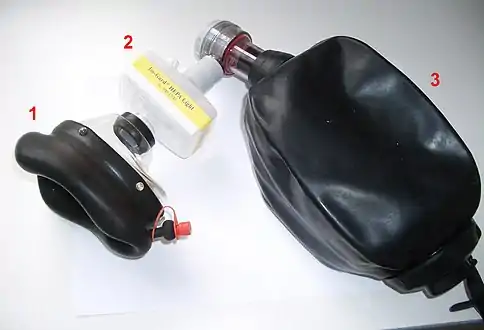 The respirator bag valve mask
The respirator bag valve mask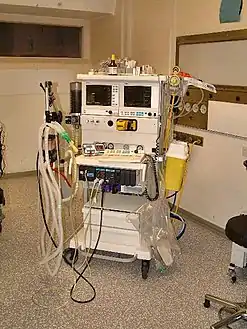 Anesthesia machine
Anesthesia machine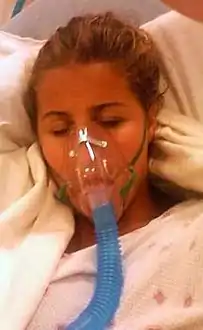 Oxygen mask
Oxygen mask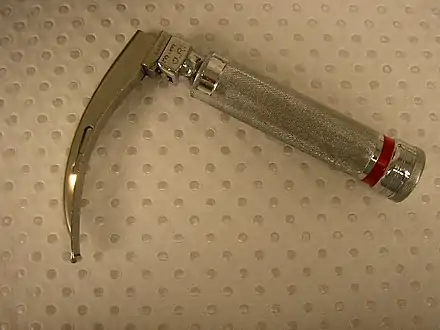 Laryngoscope
Laryngoscope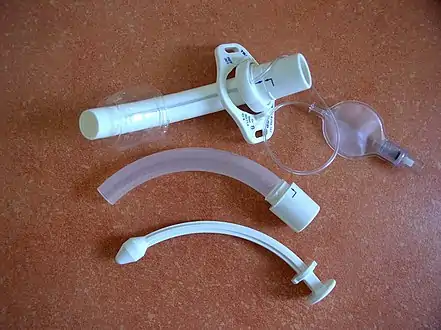 Tracheostomy tube
Tracheostomy tube Tuohy needle
Tuohy needle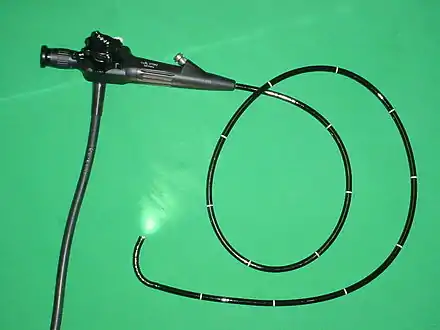 Flexible Endoscope
Flexible Endoscope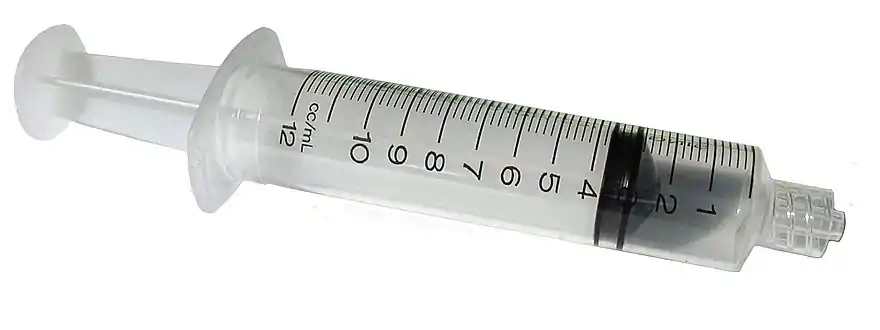 Syringe
Syringe Epidural catheter
Epidural catheter Spinal needles
Spinal needles
See also
References
- Dorsch, Susan E.; Dorsch, Jerry A. (1999). Understanding anesthesia equipment. Baltimore: Williams & Wilkins. ISBN 0-683-30487-9.
- Eisenkraft, James B.; Ehrenwerth, Jan (1993). Anesthesia equipment: principles and applications. St. Louis: Mosby. ISBN 0-8016-1556-9
- Anaesthesia – Nasal Oxygen set Oxygen Catheter Mask Airways Suction Catheter
- Eschmann Tracheal Tube – Introducer 15Ch x 60cm – SP Services (UK) Ltd
- http://commons.wikimedia.org/wiki/File:Non-Kink_Catheter_Mount.png
Further reading
- Dorsch, Susan E.; Dorsch, Jerry A. (1999). Understanding anesthesia equipment. Baltimore: Williams & Wilkins. ISBN 0-683-30487-9.
- Eisenkraft, James B.; Ehrenwerth, Jan (1993). Anesthesia equipment: principles and applications. St. Louis: Mosby. ISBN 0-8016-1556-9.
- An introduction to anesthesia. Sweden: MAQUET Critical Care AB. 2007. p. 80. Order No. 6675755.